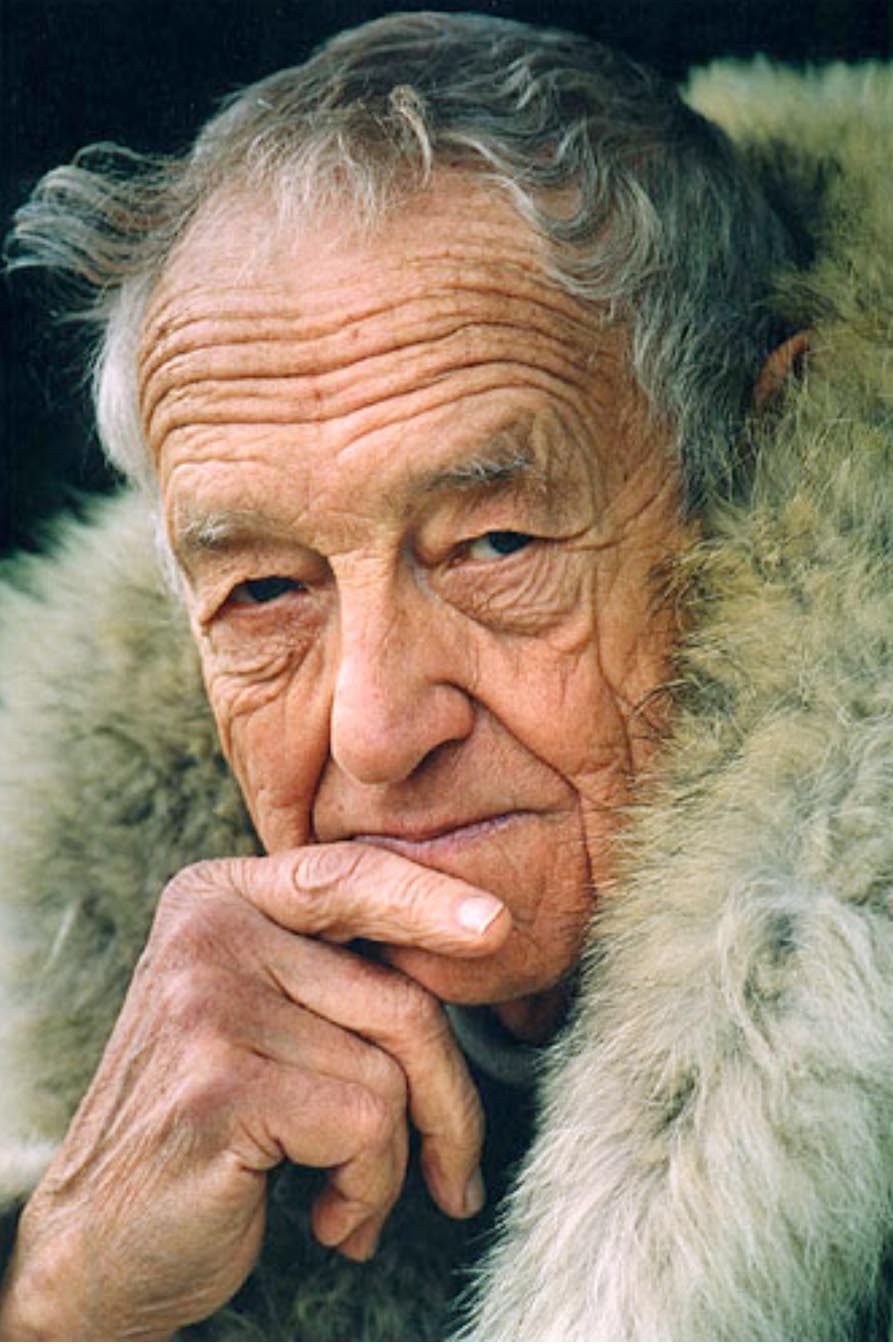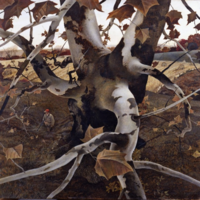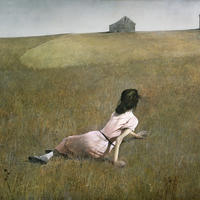More about Andrew Wyeth
Works by Andrew Wyeth

Contributor
The world of Andrew Wyeth is filled with grassy knolls, aging farmhouses, and an ode to the American middle-class.
Little do people know, Wyeth was not the country bumpkin that his paintings may lead you to believe. Wyeth often exclaimed, “I paint my life.” This one is a little hard to believe, for while his paintings of rural life can edge on vapid, his temperament and life are far from that. Yes, Wyeth was a bit of a farm boy who knew the value of solitude, but he also had an eccentric demeanor. Some of my favorite Wyeth anecdotes include: the time he took a headless skeleton to a party, his fencing matches he would hold in his studio, and that questionable moment he and his wife decided that he needed to spice up his career a bit and paint a nude 13 year old girl.
Wyeth was bred to be an artist. Due to a plethora of illnesses such as anemia, double hernias, whooping cough, and a pesky sinus condition that his doctors treated by shoving wires drenched in medicine up his nose, his father home schooled him his entire life. Rather than teaching him all the basics he would have learned in public school, his father put an emphasis on the arts. Wyeth once explained, “Pa kept me almost in a jail, just kept me to himself in my own world, and he wouldn’t let anyone in on it.” Not surprisingly as Wyeth grew older and started to fancy women, his father was not pleased. After proposing to his wife Betsy, Wyeth’s father tried to bribe him with a new studio and an endless supply of cash in exchange for him not getting hitched. Wyeth declined. Completely sheltered and neurotically focused, Wyeth clearly did not have your typical upbringing. Wyeth never really fostered feelings of animosity towards his father though, and upon his freak accident of a death (his car stalled on some railroad tracks and got annihilated by a train), Wyeth feel into a melancholic stupor.
Wyeth was venerated by the best of them. Harvard awarded him an honorary degree in 1955, Winston Churchill decorated his room at the Ritz Carlton with Wyeth’s watercolors, he made the cover of Time Magazine when Lyndon Johnson awarded him the Presidential Medal of Freedom, he was the first living artist to have an exhibition at the White House, and George Bush even threw him the National Medal of the Arts in 2007. Those are just some of his more flashy accomplishments; the full list of his achievements is much longer than that. So yeah, people really adore the work of Andrew Wyeth.
Well, some people I suppose. Wyeth’s career has always been a bit controversial and many critics cannot seem to make up their minds about how they feel when it comes to his art. In a 1977 survey in Art News magazine, one critic dubbed Wyeth both the most overrated and underrated artist of the century. Now that's an oxymoron if I have ever heard one. Another critic slammed him for working in a palette reminiscent of “mud and baby poop.”
Wyeth never did shake his sickly disposition. In fact, he once fell sick with bronchiectasis, which required the removal of part of his lung. The following day, his heart started to fail and he began hemorrhaging from his lung and blood poured from his mouth. Yuck! Somehow he managed to survive this though and ended up living until the ripe old age of 91.
Featured Content
Here is what Wikipedia says about Andrew Wyeth
Andrew Newell Wyeth (/ˈwaɪɛθ/ WY-eth; July 12, 1917 – January 16, 2009) was an American visual artist and one of the best-known American artists of the middle 20th century. Though he considered himself to be an "abstractionist," Wyeth was primarily a realist painter who worked in a regionalist style, often painting the land and people of his hometown in Chadds Ford, Pennsylvania and his summer home in Cushing, Maine.
His father, the illustrator and artist N. C. Wyeth, was a key member of the Brandywine School of artists and illustrators. N.C. Wyeth gave Andrew art lessons as a child, during which he developed the skills to create landscapes, illustrations, figures, and watercolor paintings. His influences included the landscape artist Winslow Homer, American philosopher and naturalist Henry David Thoreau, and filmmaker King Vidor. Wyeth's wife, Betsy, managed his career and was a strong influence in his work. His son Jamie Wyeth is also an artist.
One of the best-known images in 20th-century American art is his 1948 tempera painting Christina's World, which is in the collection of the Museum of Modern Art in New York City. He is also known for The Helga Pictures and his paintings of windows. In addition to being awarded the Congressional Gold Medal in 1988, Wyeth was the first painter to receive the Presidential Medal of Freedom and the first American artist since John Singer Sargent to be elected to the French Académie des Beaux-Arts.
Check out the full Wikipedia article about Andrew Wyeth












